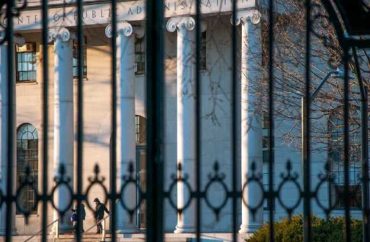
Protected characteristics include ‘creed’ and ‘political beliefs,’ according to the policy
Harvard University finalized its first university-wide “anti-bullying” and “non-discrimination” policies, setting in motion a personnel expansion and raising free speech concerns.
“The University already prohibits illegal forms of discrimination, so that piece isn’t new,” Deputy Provost Peggy Newell told The Harvard Gazette in a March 22 interview about the policies. “What is completely new today, though, is a University-wide policy on bullying.”
In the Gazette interview, Deputy Provost Newell (pictured) said that the new policies will require an overhaul of Harvard’s communications and training protocol. The university will also need to hire more administrators.
“People are going to need to be hired and trained, handbooks and other materials need to be updated, and websites need to be created and changed to ensure we are meeting the need for clarity and understanding around the policies and the supporting procedures,” according to Newell.
Discrimination is defined as “adverse treatment of an individual” based on one of more than a dozen listed “protected characteristics,” including “creed” and “political beliefs,” according to the policy document. “Bullying” means “harmful interpersonal aggression by words or actions that humiliate, degrade, demean, intimidate, or threaten an individual or individuals.”
Both policies will go into effect Sept. 1.
“Last year, I sent a message to the community that included drafts of new policies to address discrimination and bullying at Harvard,” University Provost Alan Garber wrote in a recent open letter to the Harvard community. “Following several months of community input, including email comments and dozens of outreach conversations organized by Schools and Units, the proposed policies were further revised.”
The new policies reflect the university’s priority to “provide an environment where each of us can feel that we are truly welcome to participate in the full range of University life,” Garber wrote.
“First, our policies and procedures must clearly and consistently demonstrate that our community will not tolerate misconduct and, when it does occur, enable us to hold members of our community accountable,” Garber wrote.
“Second, our efforts need to extend beyond systems that establish minimum standards of conduct, and we must discipline those who fail to meet those standards,” he continued.
This “discipline” for faculty or students implicated in misconduct may take many forms, including more than a dozen examples specified by the document. These sanctions run the gamut from a “warning,” “mandatory coaching and training” or “community service” to “expulsion” or “termination, including possible recommendation of tenure termination.”
Director of Policy Reform for the Foundation for Individual Rights and Expression Laura Beltz told The College Fix the Harvard policy risks “casting a chilling effect on free speech.”
“Harvard’s definitions of discriminatory harassment and bullying only require that conduct is severe or pervasive, rather than both severe and pervasive,” Beltz continued. “As a result, [constitutionally] protected speech that is particularly severe, but not pervasive, or vice-versa, may be subject to punishment.”
Additionally, “students may fear their speech on controversial issues will be deemed harassment or bullying and sanctioned by the university,” Beltz said. “Students may reasonably self-censor in order to avoid punishment, preventing the true marketplace of ideas that a university should embody.”
Beltz also told The Fix that Harvard students and faculty should share concerns with the administration to recommend policy improvements to “better safeguard free speech rights.”
In Jan 2023, two Harvard graduates created the Harvard Alumni for Free Speech group in response to Harvard University being ranked in the bottom 20 percent on the Foundation for Individual Rights and Expression’s free speech rankings, as reported by The College Fix.
‘Trained investigator[s]’ will collect evidence on filed discrimination and bullying complaints
A Harvard community member who believes they have been bullied or discriminated against can file a formal complaint with the university, identifying parties involved. The university will then assign a “trained investigator” who “will make preliminary findings of fact, applying a preponderance of the evidence standard, and make a recommended finding as to whether there was a violation of this Policy,” according to the document.
From there, trained “Determination Panel Members” will be appointed “to review the investigative report and determine, using a preponderance of the evidence standard, whether the Policy was violated.”
The person or group accused of violating the policy will have the opportunity to appeal the panel’s decision, according to the document.
The authors of the document asserted that these procedures “are academic and employment-related, not legal,” according to the document.
The Fix twice reached out by email to Harvard’s media office for comment and to ask how Harvard will balance implementing these policies with preserving students’ First Amendment rights on campus. No response has been received.
Provost Garber sent the updated policy document to Harvard associates on March 23 after the Harvard Corporation approved the final policy changes last December. The changes followed a draft released in April 2022 and were reviewed by the Discrimination and Bullying Policy Working Groups and Steering Committee, as announced on the Provost website.
FIRE sent a demand letter in Sept. 2022, responding to the April draft, to address concerns and suggest revisions to protect students’ First Amendment rights.
FIRE’s policy concerns for the initial draft included “overbroad definitions and examples of harassing conduct,” “a problematic definition of consent,” and “sufficient due process protections in disciplinary proceedings,” with a call to make revisions, as stated on the organization’s website.
MORE: ‘Disastrous’ administrative bloat, indoctrination to expand under new Harvard president: op-ed
IMAGES: Harvard University
Like The College Fix on Facebook / Follow us on Twitter






Please join the conversation about our stories on Facebook, Twitter, Instagram, Reddit, MeWe, Rumble, Gab, Minds and Gettr.